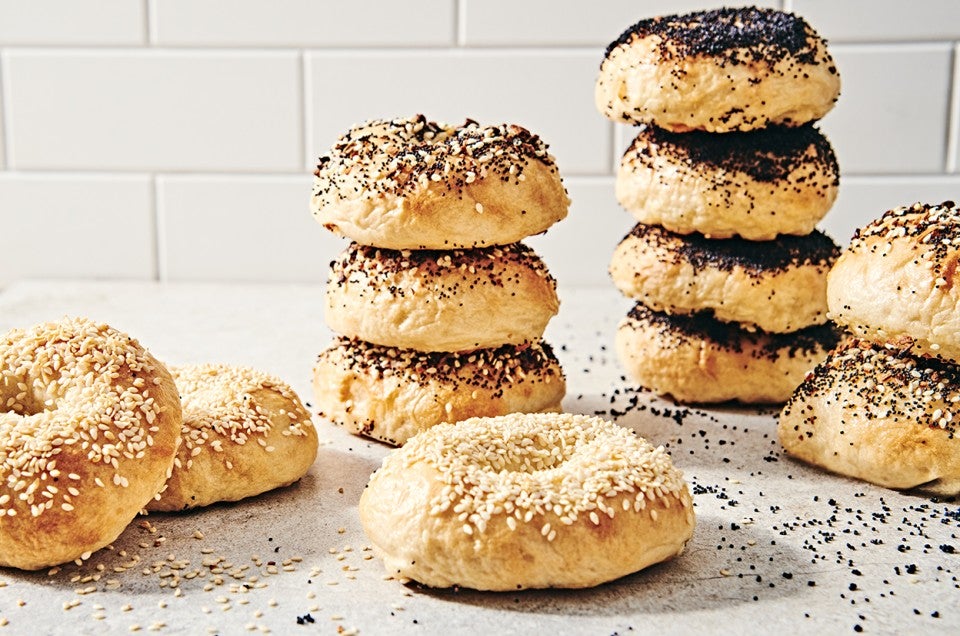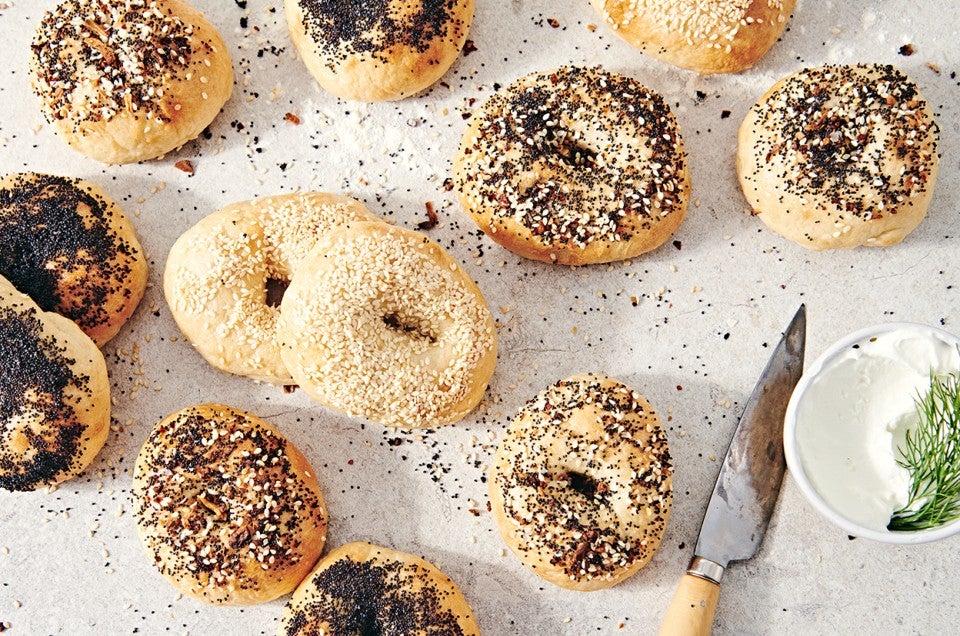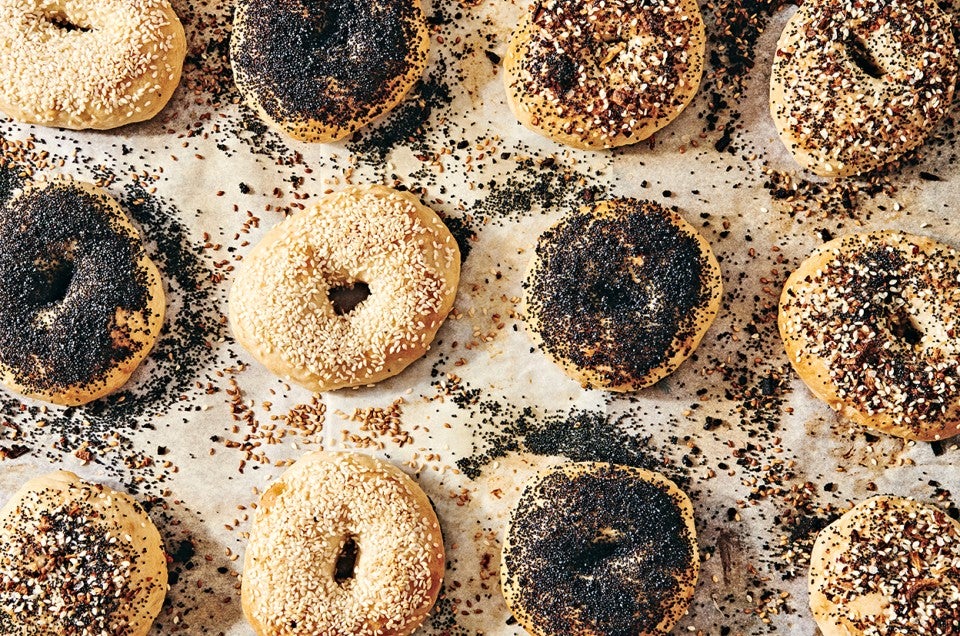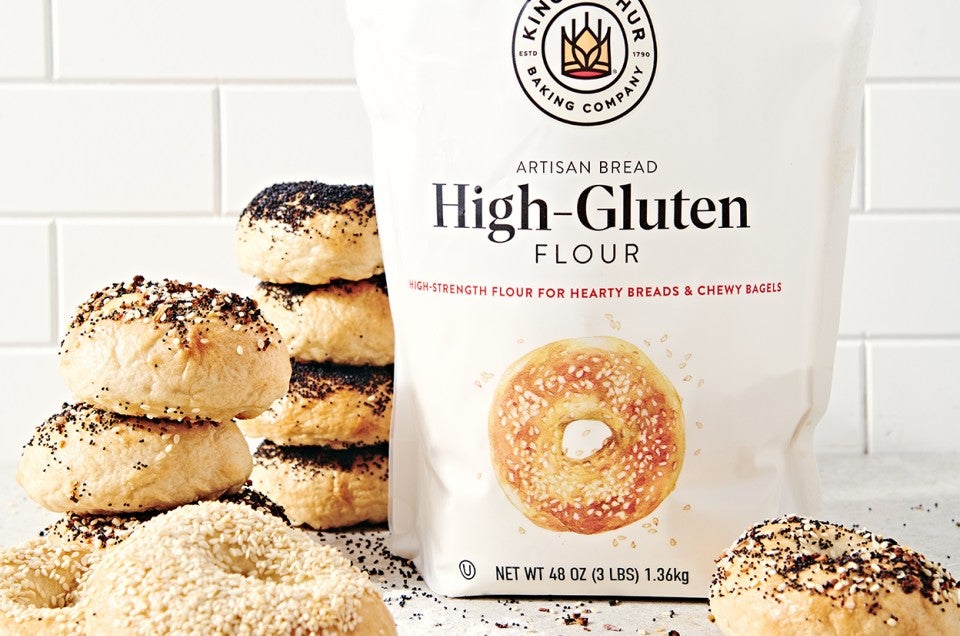Baby Bagels
Smaller, taller bagels are light-textured, perfect for toasting, and make a lovely snack-sized serving. High-gluten flour makes them extra chewy.

Smaller, taller bagels are light-textured, perfect for toasting, and make a lovely snack-sized serving. High-gluten flour makes them extra chewy.









To make the starter: Weigh your flour; or measure it by gently spooning it into a cup, then sweeping off any excess. Combine the flour, water, and yeast in a small container, stirring till smooth. Cover and let rest at room temperature for about 14 hours (overnight), until bubbly and expanded.
To make the dough: Combine the risen starter with the remaining dough ingredients, mixing till you've formed a shaggy, rough dough.
Knead the dough for about 7 minutes in a stand mixer. Or knead it using the dough setting on your bread machine. It's difficult to fully develop this dough manually, so we don't recommend kneading it by hand. The well-kneaded dough will be fairly stiff and perhaps a bit shaggy.
Place the dough in a lightly greased container (or leave it in your bread machine), and let it rise for about 90 minutes, till it's puffy.
While the dough is rising, pour water to a depth of about 1/2" to 3/4" into a large, deep skillet with a lid; a 12" to 13" skillet is a good choice. Add 1 tablespoon non-diastatic malt powder (for best shine), or 1 tablespoon brown sugar. The malt won't dissolve; that's OK. It'll be fine once the water is heated. Place a round cooling rack, or vegetable steamer, into the pan. Grease the rack or steamer with non-stick vegetable oil spray. If you don't have a large enough skillet, use a canning kettle or or other wide-diameter pan. Set the pan on the stove, but don't turn the burner on yet.
Preheat the oven to 425°F.
Gently deflate the dough, and divide it into 12 pieces. Each piece will weigh about 76g (about 2 5/8 ounces).
Round six of the pieces into smooth balls, rolling them beneath your cupped fingers on a non-floured work surface. (A floured work surface won't give you enough traction for rolling.) Keep the other pieces covered with plastic wrap.
Working quickly, poke a hole in the center of each ball of dough, and twirl it around your finger to make a hole about 1 1/2" wide. As you move from one piece of dough to the next, the holes will shrink; that's OK. While you're doing this, heat the water in the skillet or kettle to a gentle simmer.
When you've poked a hole in all six pieces of dough, place them on the rack in the skillet. Turn the heat to high to bring the water to a full boil, cover the pan, reduce the heat to medium, and steam the bagels for exactly 2 minutes. While the bagels are steaming, line a baking sheet with parchment (preferred), or lightly grease it.
Remove the lid, and use a spatula to very gently transfer the bagels to the prepared baking sheet.
Bake the bagels for 20 minutes. While they're baking, get out the seeds you want to use (if any).
Remove the bagels from the oven; they should be a light golden brown. Spray with Quick Shine (for best seed adherence). Or spray with water. Sprinkle with the seeds of your choice.
Return the bagels to the middle shelf of the oven, and place another baking sheet on the shelf above, to shield them so the seeds don't burn.
Bake for an additional 3 to 5 minutes, or until the bagels are golden brown. While the first batch of bagels is getting its final turn in the oven, ready the next batch: gently deflate the balls of dough, shape into rounds, poke holes, steam, and place on a pan.
Remove the first batch of bagels from the oven; put the second batch in. Cool the finished bagels on a rack, or right on the pan. When all the bagels are baked and cooled, store them airtight, at room temperature.

View our privacy policy

